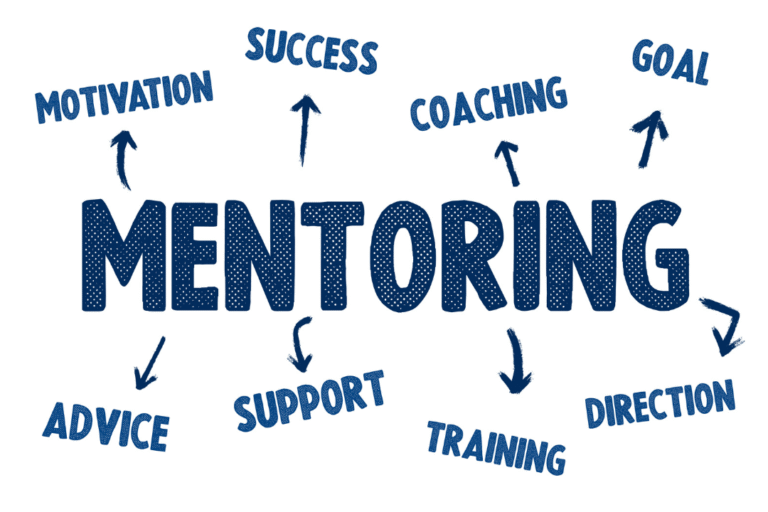
Are you feeling a little lost on your career path?
You’re not alone. It’s completely normal to seek guidance as you navigate the complexities of your professional journey. One of the best ways to gain clarity and direction is by finding the right mentor.
But how do you go about finding someone who can truly guide you? Let’s dive into the world of mentorship and discover how you can find the perfect mentor to help you thrive.
What is mentorship?
Mentorship is having someone in your corner, someone who guides, supports, and inspires you to reach your fullest potential. It’s a relationship where the mentor/s shares their knowledge, skills, and experience to help another person, the mentee, grow and succeed.
Mentors have historically been seen as a 1 to 1 relationship, but, more recently, a person can have a cabinet of mentors for different parts of their career. One for skill building, one for brainstorming, one for relationship building, etc. It’s easiest if a few individuals could meet more than one aspect of your goal, but this doesn’t have to be the case. You can have more than one person be your mentor.
Who can be a mentor?
Here’s the good news: anyone can be a mentor! That’s right, anyone. Whether you’re a seasoned professional or someone with a unique life experience, you have valuable insights to share.
Have you ever thought about how your personal journey could be a beacon for someone else?
It’s true!
You don’t have to be a CEO or an industry expert to make a difference. What matters is your willingness to listen, to offer guidance, and to be there when someone needs a boost.
Think of the people in your life who have guided you: teachers, family members, or maybe a friend who always seemed to have the right advice?
These individuals may have been mentors without even realizing it. And just like them, you can be a mentor too! It’s about connecting on a personal level, sharing your experiences, and encouraging others to reflect on their paths.
Understanding the Importance of a Mentor
Too many of us go throughout our career not asking for help, afraid of what it might mean for us. This is a key imposter syndrome thought – “if I ask for help, they’ll know I don’t know everything” – this is further from the truth. In reality, people want to help, they just don’t know how until someone asks.
Imagine having a seasoned guide who has walked the path and can offer valuable insights, share personal experiences, and provide guidance tailored just for you. Would this make your life easier?
Your relationship with your mentor depends on how much you’re willing to engage, and the bandwidth of your mentor to support your growth. They can share their pitfalls, help you see unfamiliar threats and opportunities, they can advocate for you in closed rooms, they can aid in your promotion, they can open doors from the inside, they can be your cheerleader. Your potential with a mentor is exponential.

What are you seeking in your career goal?
Before you start your mentorship search, take a moment to reflect on what you want in your career and life.
What are your professional dreams?
What skills do you want to develop?
Are you looking for someone who can help you with specific tasks like public speaking, or do you need broader career guidance?
Write down your goals and keep them in mind as you search for a mentor. After all, how can you find the right person if you don’t know what you need?
The more questions you ask yourself and more you’re able to prioritize your needs, the easier it’ll be for you to identify what you need. And sometimes, that can be a tough challenge in itself. This is where working with a coach can offer tremendous benefit – coaches are trained to ask you the right questions and challenge your assumptions to get you to the core of your desire and field the distraction from the pith.
Where to find your mentors?
Now that you’ve reflected and gained some clarity, it’s time to start looking for your mentor.
The starting place can be overwhelming because the possibilities of finding people are endless – networking events, professional organizations, and even your own workplace can be great places to meet potential mentors. But, most of us fail to recognize relationships we’ve already built, be it your managers, professors, researchers, colleagues, or family members and friends.
Let’s for a moment focus on the easiest access – family members and friends. We often bucket our family and friends into social relationships and not professional relationships – why?
You’ve built relationships, and you already know they care about you, you likely have their contact information, you can easily ask for advice, you can meet up or zoom your way to getting their perspective. Now, there is a danger to overbearing family members – who might overplay their support. But, having strong boundaries in these relationships can help you.
For example, I had a client who wanted to reach the Director level position in an organization. They were trying for 2 years, but couldn’t figure it out. They knew they were ready for the responsibilities and the position was opening up again. While we were addressing their materials, I asked them about their mentor – who did they know? What positions were they from? Their immediate answer was “I don’t know anyone” – this quick response made me wonder… So, I asked the client to do a quick exercise – post on Facebook – does anyone know someone from company X? Within two days, they received a couple of messages guiding them to their aunt – who was a SVP at the company.
The client didn’t know because their extended family member fell into the family bucket, not a career/mentor bucket.
This was a near miss opportunity that turned around quickly because they reached out not for a referral but for advice; that advice helped them see the gap between where they were and where they needed to be for the director position. Later, we started working on their leadership and communication skills to level them up. Within 3 months, they received the Director position.
Focus on where you already have an established relationship, before reaching out to new contacts. If you need to reach out to new contacts, maybe because you’ve moved or are in a specialized industry – focus on joining a professional association (LINK), these can offer you access to experts in your industry. Another option, source your leads through LinkedIn – not ideal, but helpful. LinkedIn engagement tends to be low for most professionals, unless they are actively marketing themselves for their professional growth. LinkedIn is great for connecting with people, and keeping in touch with them. Mentorship requires more constant communication to build a strong relationship.

Reaching out to potential mentors
Don’t over think it – just because you want them to be your mentor, doesn’t mean they have the bandwidth to be your mentor.
It’s important to recognize they are also busy and have other mentees or their own mentors that can take from their bandwidth – it’s not a person, it’s just the reality of the situation.
For example, imagine talking about marriage on your first date – it’s a bit too much too soon.
Reaching out can feel daunting, and the first 3 messages will feel uncomfortable. But, as you continue sending messages and start your connections, the responses will become easier. Especially if you’re messaging on LinkedIn – you can message 10 people in 10 minutes. Don’t over burden yourself with messaging everyone on the same day. Always think about quality over quantity.
In person outreach is a lot easier, you get immediate feedback. Focus on starting a conversation, it’s all networking (LINK), but the focus isn’t to ask them to become your mentor, but for you to ask them about how they did it. What advice or insight can they share about the company, position, industry, etc. be curious.
As you start building your network, ask for 1:1 chats or coffee meetings. This is where you start building a relationship, not yet a mentorship.
Building a Relationship: The Key to Successful Mentorship
So, you’ve made contact, had some good conversations. Congratulations!
Now, how do you build a mentor-mentee relationship?
It’s all about communication, mutual respect, and setting clear expectations. As you stay in regular communication, you can formally ask if they have the bandwidth to support you as your mentor or more indirectly, ask them if you can ask them for their advice and insight from time to time.
You’re in the stage of building a relationship. When you’ve asked for advice and insight, follow up with them to share how you’ve used this information and the impact it had on you, your project, your meeting, etc. Show the value add they contributed to your success and follow up with more questions.
Warning* this should not be a one sided relationship, but more back and forth. If you’re early in your career it might be 80-20, and as you advance closer to their level of experience it might become 50-50. Regardless, ensure that they get something of value from the relationship.
For example, I really appreciated one of my early mentors. She helped me learn how to navigate the corporate space and the importance of building strong relationships. Although she doesn’t serve as my immediate mentor any more, after 10 years, I reach out 1-2 times a year to share how I’m doing and check in on how she’s doing and if there is any way I can support her.
Building a relationship is about regular check-ins, open communication, and scheduling time to ask questions and share about yourself.

Embrace the Guidance
When you meet with your mentor, be open and ready to listen.
Are you willing to accept feedback, even if it’s tough to hear?
Embrace their advice and apply it to your career.
Remember, growth often comes from stepping out of your comfort zone. Reflect on their guidance and use it to sharpen your skills and improve your professional life. How can you incorporate their insights into your own journey?
The more adaptable you are, the more you’ll gain from this partnership. Building a mentorship-relationship is about building trust and trusting your mentor will have the best of intentions for your success. Not all advice will work out, but you’ll need to assess how their advice fits into what you’re seeking to advance.
Remember, not all advice needs to be for a BIG project or accomplishment. It can be as simple as email management or writing and communication.
Are they right for you still?
Over time, it’s important to evaluate your mentor-mentee relationship.
Is it working for you? Are you benefiting from their guidance? Do you still feel aligned in your goals?
It’s okay if the relationship evolves or if you find that it’s no longer the right fit. Be honest with yourself and your mentor. It’s better to gracefully end a mentorship than to maintain one that isn’t beneficial.
Remember, it’s all about your growth and development.
Again, it’s not personal, it’s just the course of the relationship. Some relationships are lifelong, some are seasonal, some are need based. Determining the relationship and how they fit is important for both you and your mentor.
The end of a mentor-mentee relationship doesn’t just end and you never talk to each other. For my example, my mentorship relationship ended over 10 years ago, but I’m still in contact and we keep in touch because at one point their advice and insights helped shape who I am. Now, when we catch up it’s more 50-50 because we’re in different stages of our career.
Focus on your goals, as they change, the need of your mentor might also change. And that’s part of your career and personal growth.
Continue building relationships with people because at a certain point, you’ll become the mentor for someone else.
The circle of mentorship - giving back
Finally, as you grow and develop in your career, consider the impact you can have on others.
Have you thought about becoming a mentor yourself?
Sharing your experiences and knowledge can be incredibly rewarding and help you grow in new ways. Imagine being the guide who helps another young professional find their path.
There’s a misconception that you need to be well established before you can become a mentor, but that’s not accurate. You can mentor a peer, you can mentor someone 1 year junior to you, or even someone starting to enter your field of interest.
Seek to give back to your community – support those in need of your insights and advice.
Seeking support
Finding the right mentor is a journey in itself.
It’s about knowing what you want, reaching out, building relationships, and being open to growth.
You are ready to take the first step – remember, the right mentor can make all the difference, but it’s your job to understand your goals, have clarity, and assess and reassess if your current mentor is supporting your growth.
Building a mentorship relationship can take time – usually takes 6 months of more to build a level of comfort for a strong mentor-mentee relationship. And it’s crucial to invest your time in these relationships. Working with a coach makes life easier because they’ve seen many of the challenges you’ll face in your professional development – they can aid in your development and make your journey easier and faster.
Mentors can’t replace working with a coach, mentors enhancing the coaching experience and vice versa. Learn how we can support your journey to building meaningful mentorship relationships while advancing in your career by scheduling a free consultation.

